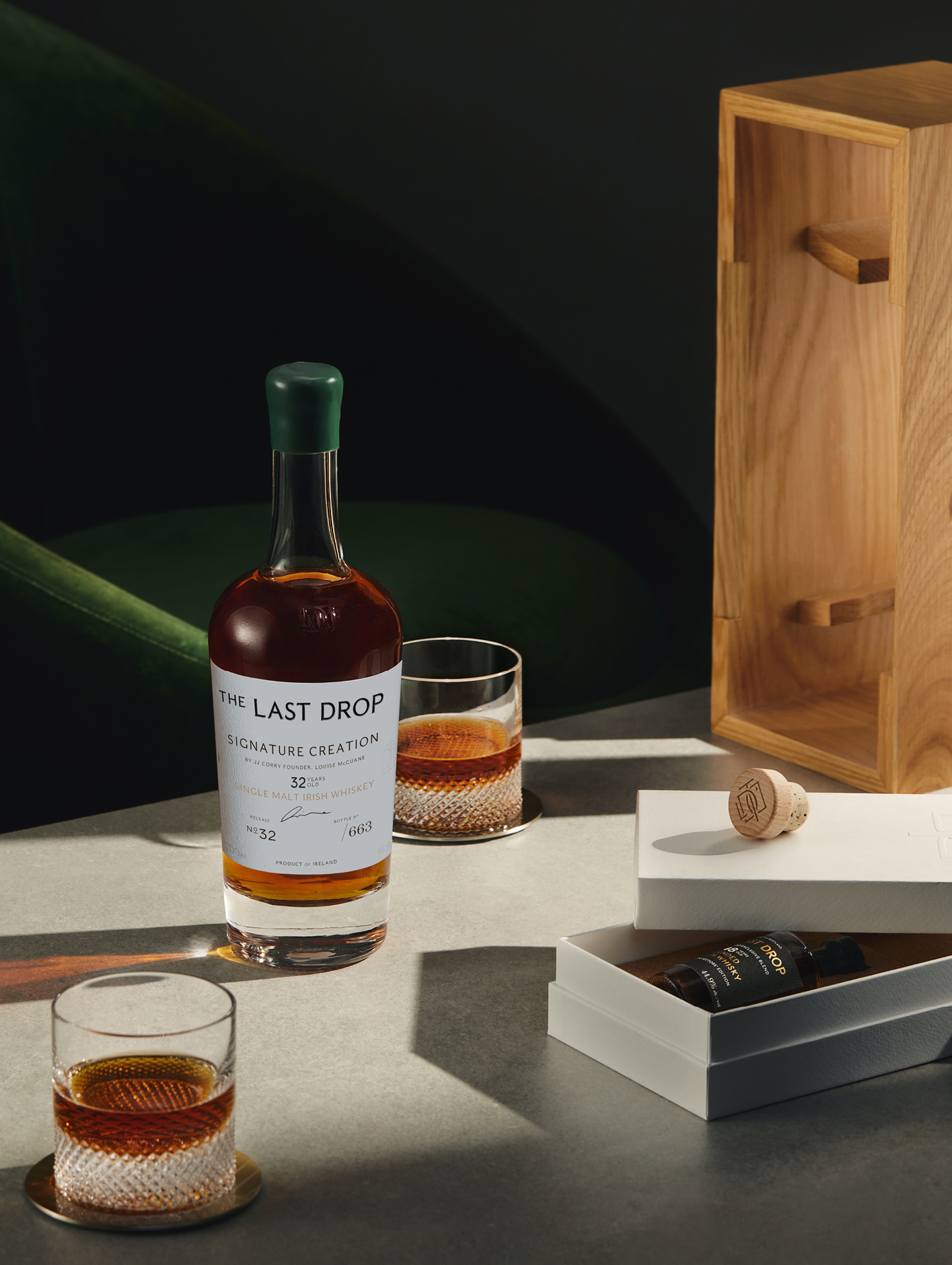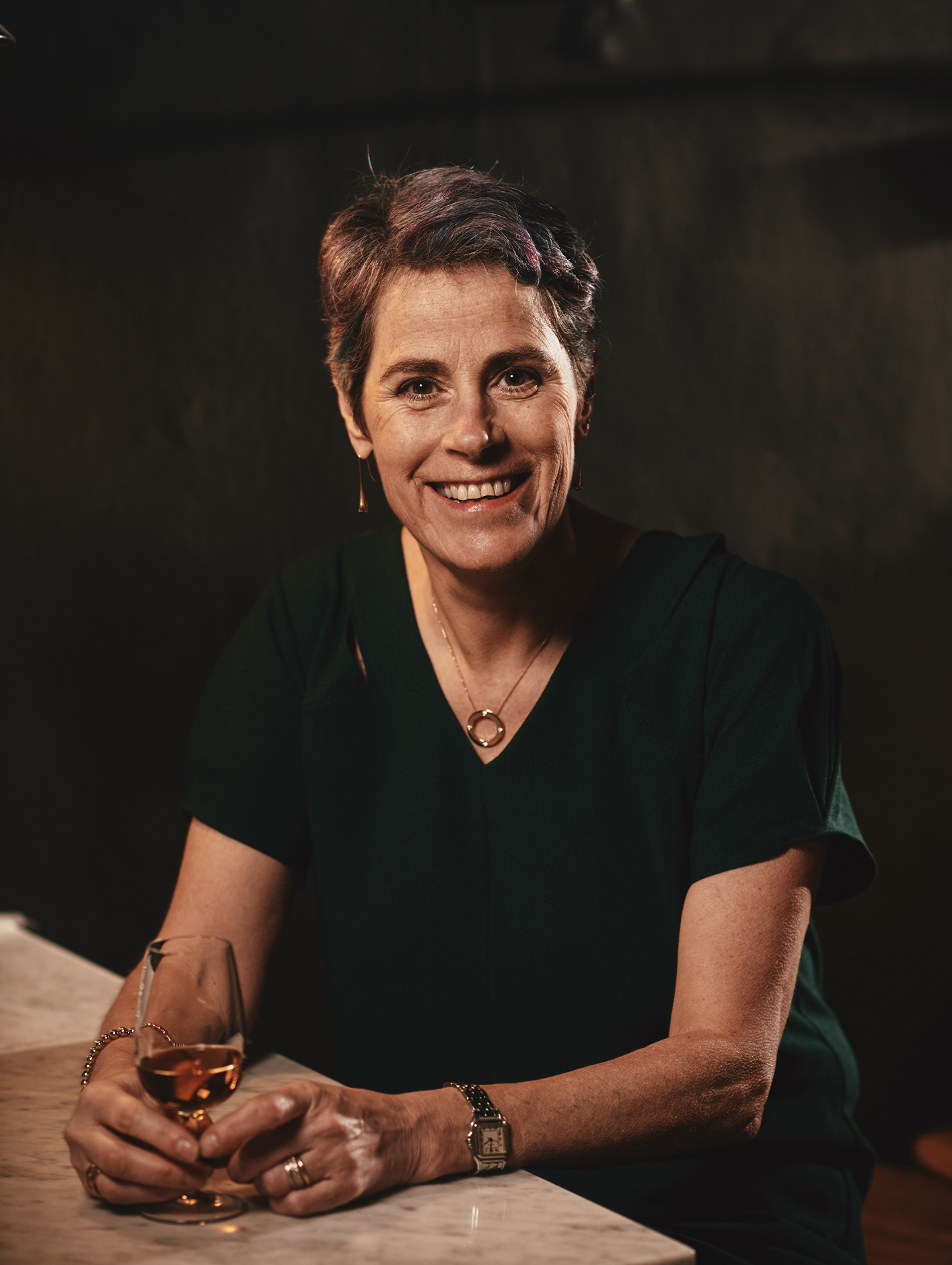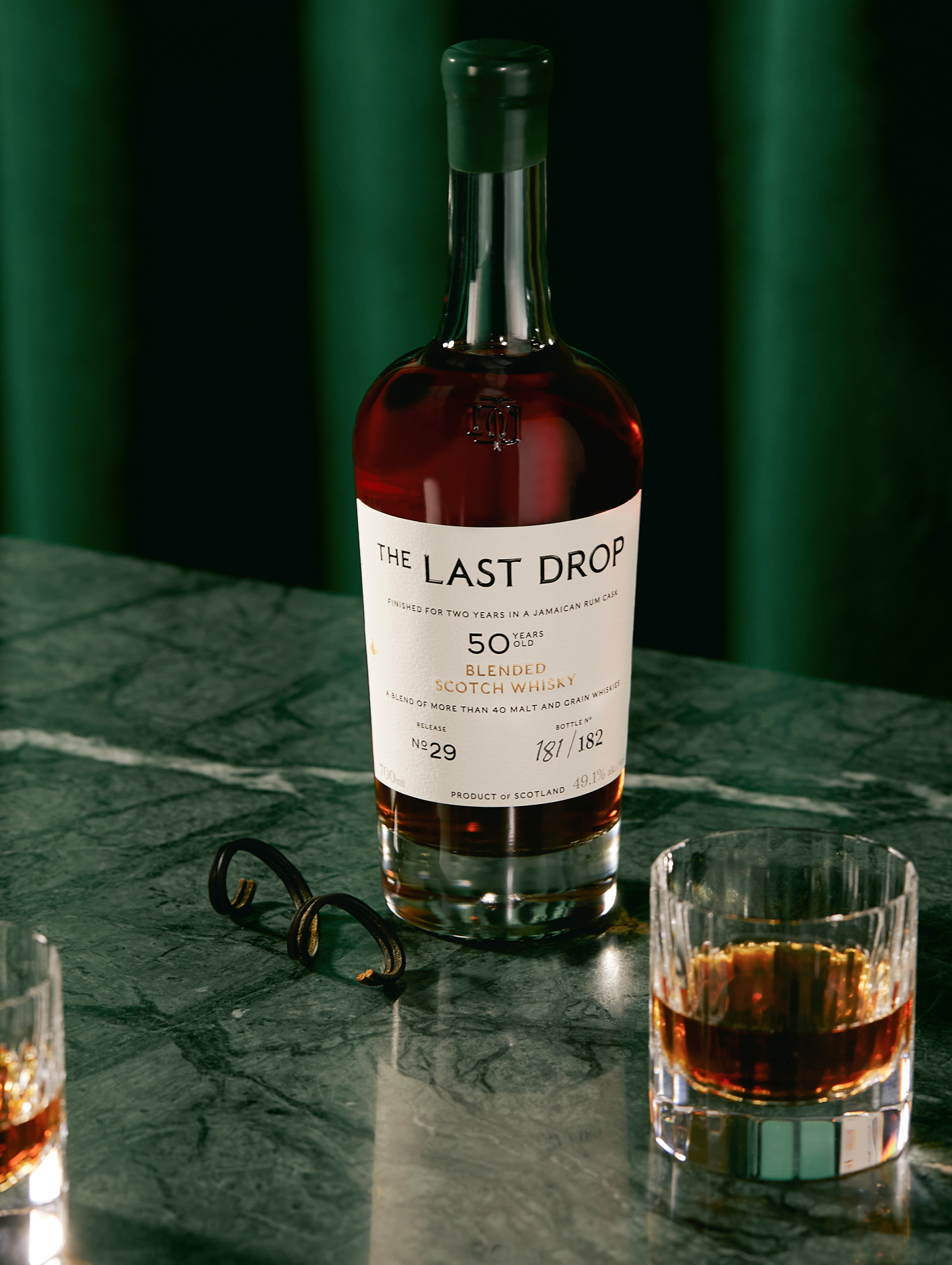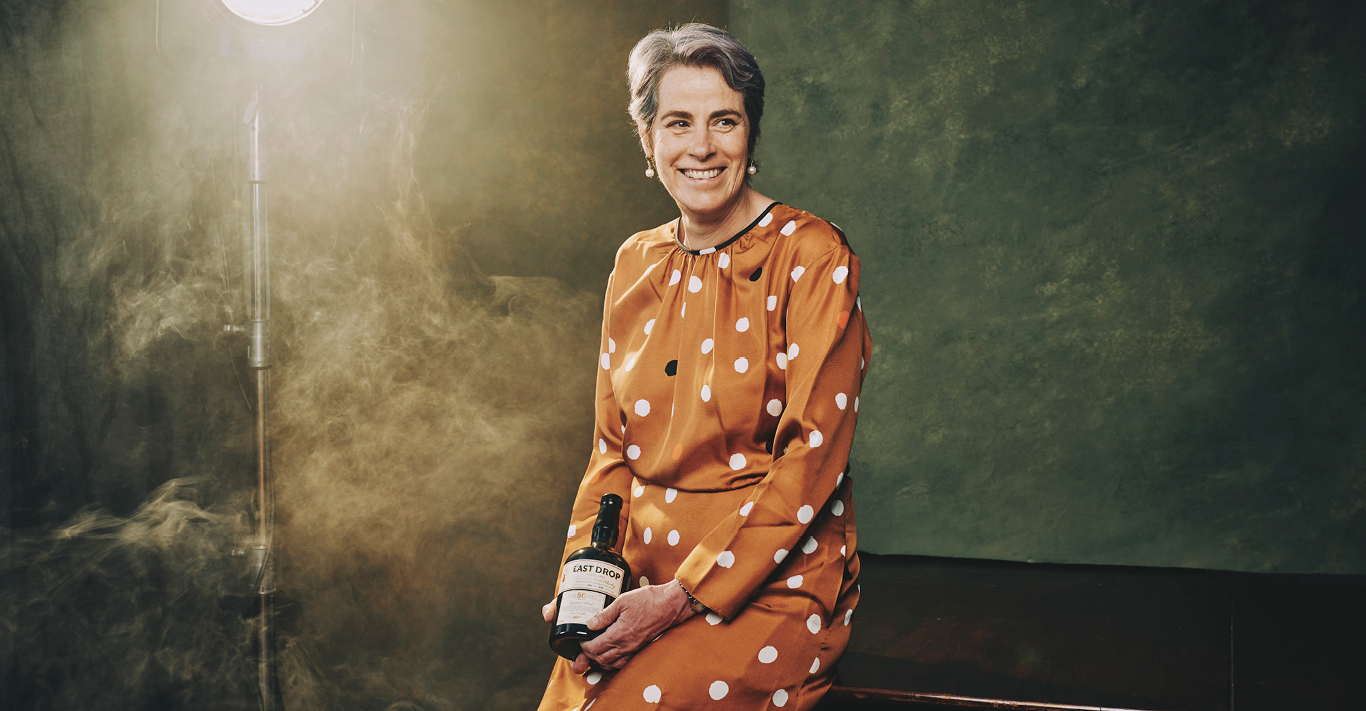WORDS
Imogen Almond
Can you tell us a bit about your background and how you got into the premium spirits business?
My father and his long-time business partner, James Espey, who both worked in the drinks industry for many decades, started this business in 2008 with the kernel of an idea to find and bottle some very old and rare whiskey.
Everyone who encountered The Last Drop Distillers in the early days were all very charmed by the idea of these two old men starting a company – my father was 82 when it all first began! I started helping out in 2010, where my role very much began as support and help. With a background in design, I also helped with things like label design.
The big shift came in 2014 when James’s daughter, Beanie, moved back to the UK from Hong Kong and we met for the first time. We are very different in age and worked in very different sectors but, together, we felt brave enough to offer our services as we believed we could contribute more to the company. We went to them with a proposal that we join the business to try to make The Last Drop Distillers a bit more structured and forward-looking. I have been with the business ever since.
We have massively changed the way we operate since 2014. We sold the company to a large American business called Sazerac in 2016. After Beanie stepped away a couple of years later, I became the sole managing director in 2018.

Did you have a passion for spirits before joining the company?
My love for spirits really came from working with my father and James. Apart from the fact I have a father who had been in the industry for many years, and who was also a passionate Scotch whisky devotee, I don’t think I knew that much, and it’s been a real joy to learn. Beanie and I were very quickly charmed by the remarkability of spirits and with the chance to work with our fathers to respect and honour what they had created.
Personally, I think my lack of knowledge stood me in incredibly good stead because it allowed me to be the middle ground between the people who create something and the people who enjoy it. It’s alright not to be an expert as it gives you that perspective. It’s OK not to know everything and work it out as you go along – that applies in work as well as spirits.
Can you tell us a bit more about The Last Drop Distillers and what it takes to become a “spirit hunter”?
The word “hunt” is very evocative – we’re not really digging around in caves! What we are actually doing is talking a great deal and being open to opportunities. A lot of it is knowing who to ask and following through with the experts to ensure that what you’re buying isn’t just a story but also an exceptional and delightful liquid.
We have been described as the Indiana Jones of the spirits world, which obviously isn’t quite right, but there are loads of ways of being an adventurer and it’s not necessarily on the back of a horse with a whip and a leather satchel.
What factors go into creating a great spirit?
We are very much at the mercy of people who have long since gone, or retired, who created such magical liquids and didn’t bottle them when they were young. We promote bottles that are old and rare, but also fresh and delicious. All in all, I think it is important that they are delicious – you don’t have to be an expert to appreciate a great tasting spirit. Also, I believe the story behind the spirit is very important and it is our job to find the story and showcase why that matters.

With so many independent bottlers in the UK and across Europe at the moment, how do you stand out from the crowd?
One way we stand out is that we are very cross-category. Most independent bottlers are Scotch whisky bottlers while some may also bottle rum, and occasionally a cognac. We, on the other hand, stock a wider range, including port and pinot. We are also currently looking further afield at stocking tequila or agave spirits in the future.
The other facet of that is, while the categories are quite broad, the amount we stock is quite small as we don’t stock young, cheaper releases. Everything we do is finite and unique. We are set apart by both our breadth and our narrowness. We live or die by the quality of what we put into a bottle and, so far, we haven’t had anyone disagree, which is a testament to not only our quality, but the quality of those we ask to help us.
Is there a tipple that you showcase at The Last Drop Distillers that you have become particularly fond of? If so, what and why?
This is a really hard one because there are so many different reasons why something can be your favourite – it is partly about taste and it’s partly about story. But the one I talk the most about is the 1925 cognac, which just has the most romantic story behind it:
It was discovered behind a wall in a barn where it had been hidden just before the Germans were approaching South West France before World War II. When I was fortunate to taste it for the first time, there was something about it that just kept drawing me back and I couldn’t quite put my finger on it. I was with a colleague and seeing that he, knowing a great deal, and me, knowing very little, both knew there was something special about it was really fascinating. To cap it all off, it was distilled the year my father was born, and it was bottled the year he died so, for me, it is by far the most emotionally resonating story.
Do you find it hard to part with the spirits that can’t be recreated again?
The Last Drop Distillers began with the phrase, ‘before there is no more’. It’s a lovely and powerful expression because it’s saying that no matter if there are 20 bottles or 1,000 bottles, once it’s gone, that’s it. When you know the last bottle has been sold there is a bit of poignancy.
But on the other hand, the most magical thing is knowing that the bottle will be drunk and will produce a completely new story for those who drank it. We get a lot of lovely emails from our consumers about the stories that have come from them drinking the bottle and, for us, that is what we treasure the most.

Working in a male-dominated industry, what challenges have you faced in your career and how have you overcome them?
I came to the industry when I was in my 50s and I am, so far, fortunate enough to have encountered very few issues – I think it helped that I am the daughter of someone who was very liked and respected in the industry. Also, I had the confidence of having a companion in Beanie and we both gave each other a lot of belief in our skills.
Having said that, the first time we visited China without one of our fathers was quite interesting because we were very much not of interest to the assembled company. There was a sense that we were very much “the lovely assistant”. We were both very much taken aback because we were there to talk about the business and the wonderful spirits we had to offer and there was a definite air of disinterest. It gave us both pause for thought about how to overcome that, and I believe the answer is, largely, confidence. I was so glad I was with Beanie at the time because having someone to laugh with at the situation made it an awful lot better. If I had been on my own, it would have been unbelievably unnerving and upsetting.
However, in the States we’ve had a very positive response to the fact we are women – I think that is part of the charm of the business.
What is your next focus or goal?
We have an amazing team in place who are going to set the scene for the future of The Last Drop Distillers. Those two strong young women who will be heading up global marketing and sales (Alice) and operations (Lucy) are going to make an enormous difference to where we go and how we communicate. They will take that kernel of what we have done so far and turn it into something for continued new audiences… and I can be wheeled out from time to time to do a bit of storytelling!
For me, my ambition now is to learn to let go. That doesn’t mean I don’t want to be involved, but I want that involvement to be a very different one.
I also want to run with this notion that I started in this business very late. With my father starting The Last Drop Distillers at 82 and James at 65, that is very inspirational to me, and I hope that I can use my story to empower others and make this my legacy.





